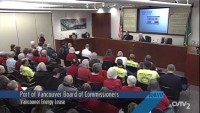Columbia Riverkeeper works with people in dozens of communities—from rural to urban—who share the same goals: Protect the health of their families and the places they love.
Case Study: Setting Precedent for Transparency
The Washington Supreme Court ruled in favor of Columbia Riverkeeper over the Port of Vancouver on June 8, 2017. Port of Vancouver Commissioners met in secret with each other—and with representatives of Tesoro—to discuss Tesoro’s proposal to build the nation’s largest oil-by-rail terminal. The Port leased land to Tesoro, paving the way for the highly controversial terminal. The Port argued that it could keep many facts hidden from the public. The Supreme Court rejected the Port’s approach, stating that the law is “crystal clear in its response to such arguments: The people do not give their public servants the right to decide what is good for the people to know and what is not good for them to know.” This case established Supreme Court precedent that Ports cannot abuse exceptions to the Open Public Meetings Act to hold executive sessions. This precedent will help stop future backroom deals. Holding elected officials accountable in court matters now more than ever.




